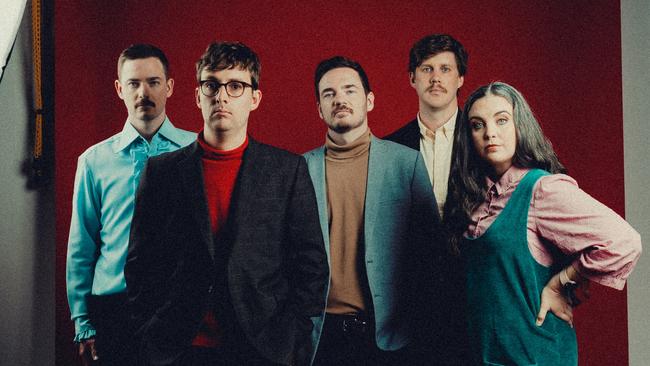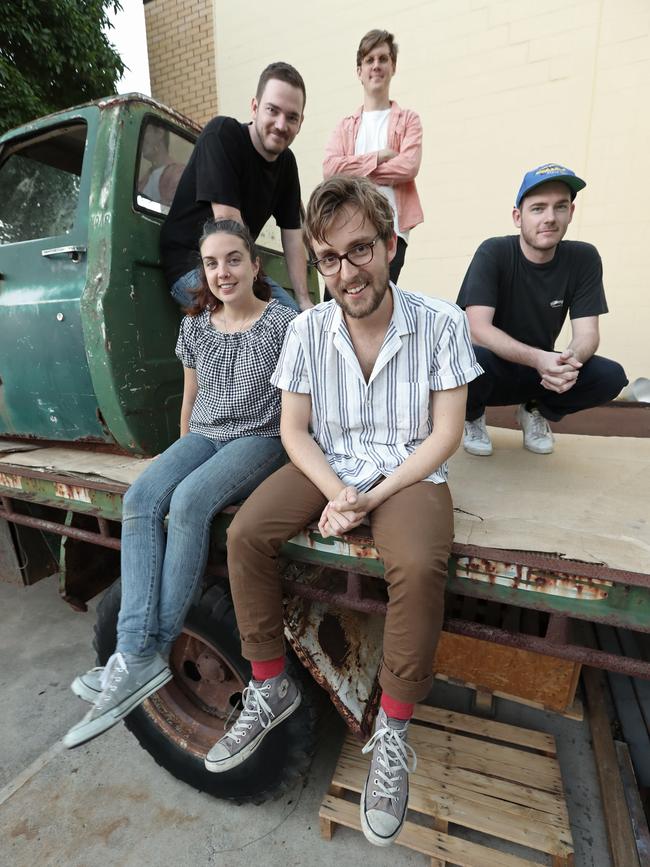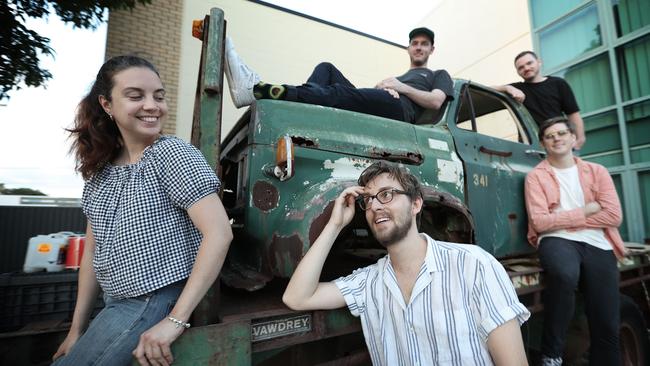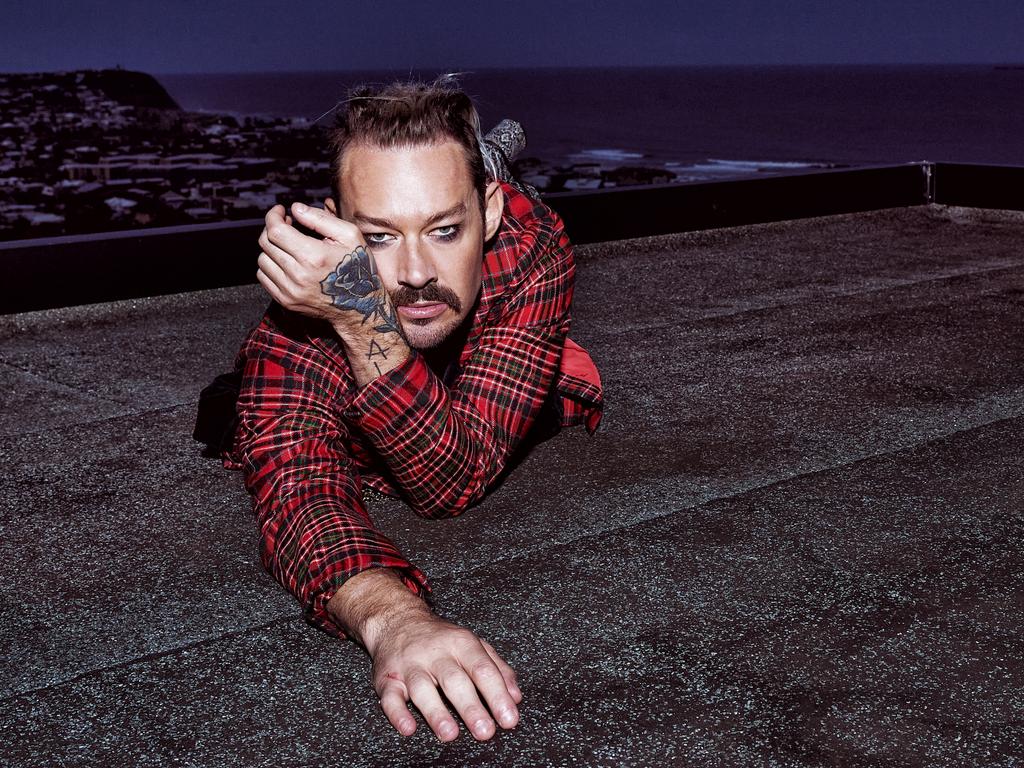Brisbane’s Ball Park Music on staying friends after 7 albums and 14 years together
Thirteen shows over seven days, with not one of their fans permitted to stand ... while this Covid residency kept Ball Park Music in the game, it almost ruined them.

All too often in popular music, reliability and consistency are underrated and undervalued traits. Both are admirable, even desirable, yet the absence of an obvious narrative hook or surprising curve-ball can sometimes leave worthy acts overlooked in favour of more dramatic or more compelling storylines.
Brisbane band Ball Park Music has reliability and consistency baked into its DNA, but looking back, there’s nothing particularly dramatic about its story so far, which goes like this.
In 2008, five students were thrown together essentially at random to form a band for a university assignment. The name was chosen because they liked the two-word expression for a rough estimate, rather than out of any fondness for baseball.
Together, the budding musicians found they had such rare chemistry and a like-minded work ethic that, 14 years and seven albums later, they’re not only still together – they are now comfortably one of the most popular rock bands in the country.
Indeed, the group is fast running out of contemporaries of a similar vintage, both in terms of staying power and crowd-pulling power. Without hubris, they’ll happily discuss acts such as Hilltop Hoods, Paul Kelly, Parkway Drive and Nick Cave as examples of long-lasting acts who continue to inspire.
Although its story so far is one of steady growth and clear artistic development, it also contains few headline-worthy sound bites. Ball Park Music has never topped the ARIA album chart, although its last five releases have debuted in the top 10. It has never won an ARIA Award, though the quintet has been nominated five times. None of its songs have won the Triple J Hottest 100, although 12 have featured in the countdown across the band’s career; the closest it has come was a No.4 result in 2020.
Having weathered minor crises of confidence earlier in the band’s career while getting a little disoriented by some music industry smoke-and-mirrors that attempted to push them toward more commercial songwriting, none of the musicians are much bothered by these realities. There’s no tantrums to be endured through gritted teeth; no sniping behind backs, nor delicate egos liable to be shattered by a gentle breeze.
Instead, there’s an amiable stillness detectable inside Prawn Records HQ when Review visits on a Tuesday afternoon in May, a few weeks before the release of its seventh album, titled Weirder & Weirder.
As they run through new songs, the presence of an outsider at rehearsal could easily blow some of these dense arrangements offcourse. It might for a lesser band, but Ball Park Music is not one of those.
After a gorgeous run-through of album opener Manny – whose hypnotic groove and 12-string guitar riff is also being discussed as a potential set opener for its upcoming national tour – the five musicians look up and smile at one another.
“I love how disciplined we play when someone’s here, it’s really helpful,” says singer/guitarist Sam Cromack with a laugh, prompting an idea from keyboardist Paul Furness: “We should pay people to come and watch us rehearse.”
Situated a short walk from the bustling entertainment precinct of Fortitude Valley, Prawn Records – so named for the independent label on which the band releases its music – is one of several spaces the band has used in the Queensland capital during its lifespan.
When Review last checked in with the group in early 2018, ahead of the release of fifth album Good Mood, its headquarters was in the northern suburb of Stafford, where neighbours included smash repairers, welders and sheet metal manufacturers.

The Valley shift has meant there are fewer mechanical noises to battle with nowadays, although Harley Davidson riders using the busy road outside can still derail recording sessions. The members have no idea what they sound like from outside; they laugh at the idea of someone walking past, catching a few muffled notes through the fibro walls, and thinking they’re overhearing a decent Ball Park Music cover band.
On display four years ago was their easy sense of camaraderie and mutual respect, and it’s become even more apparent since then. During the pandemic, plenty of bands – even successful ones – either put their efforts on pause or broke up altogether, due to a lack of revenue from live performances.
For the quintet, being based in Brisbane was a blessing of sorts. Queensland’s success at containing the coronavirus through border closures meant that crowds could gather for much of the past two years with only a few short interruptions.
Unable to tour interstate around the release of its sixth and self-titled album, the band opted for a highly unusual residency at inner-city venue The Triffid, where it played 13 sold-out shows across seven days in late October 2020 to seated audiences.
Revelling in the chance to play to crowds when many of its colleagues in southern states could not, the band truly leaned into the experience, offering unique setlists for each show and playing 45 different songs across the run, including covers of Radiohead and Neil Young.
“It was definitely one of the best things we’ve ever done,” says Cromack of The Triffid residency. “It destroyed us, but it was like a boot camp sort of thing; I reckon we got at least 20 to 30 per cent better as a band, after that.”

That self-titled album contained a single named Cherub, which has quickly become one of the band’s most popular songs: it has 11 million streams on Spotify alone, and will soon eclipse much older favourites such as It’s Nice To Be Alive (2011 release, 19 million plays) and She Only Loves Me When I’m There (2014 release, 14 million plays).
Built on Cromack’s acoustic guitar chords, a highly memorable melody and bassist Jen Boyce’s vocal harmonies, Cherub is an unusual song that rewards patience: three quiet minutes pass before the five musicians begin truly playing together, and close out the five-minute track with a stirring, wordless conclusion completed by Daniel Hanson’s thumping drums.
Among many strong contenders, it is the band’s finest work to date; a song that’s achingly beautiful and original, yet somehow so familiar, as though it had always been floating in the air until Cromack plucked it from the sky and plugged it in. Perfectly matched to a music video centred on butterfly flight – filmed by guitarist Dean Hanson in his back yard during a lockdown – its No.4 result in the Hottest 100 of 2020 was well deserved.
As well as possessing reliability and consistency, Ball Park Music has another core quality at its heart: true friendship. Most of being in a band is composed of unglamorous in-between moments, away from stages, studios and adoring fans. On tour, if you can’t enjoy the company of your bandmates during the 22 hours of waiting around for showtime, you’re f..ked.
“I think something that we never appreciated about our band – or about any band that we grew up idolising – is that you think it’s all about the music,” says Cromack.
“And of course it is; but with a group that sticks together, you underestimate how much that element of friendship, or teamwork, is part of the appeal.
“We never even thought about it – but now, as far in as we are, it’s one of the comments we hear most, especially when we meet younger artists that are supporting us: ‘What – you guys have been a f..king band for this long, and you’re still friends?! That’s so sick!’”

After rehearsal winds down with satisfying play-throughs of a few more new songs, including The Present Moment and the title track, the drummer, bassist and keyboardist farewell their colleagues, leaving the two guitarists to reflect on their unusually long creative life.
“We’ve always celebrated our victories and successes together,” says Dean Hanson. “I don’t know whether there was a particular moment early on where it could have easily gone the other way; I think we’re just naturally not competitive people, in that sense, and that helps you to be happy for your friends. No one’s ever gotten carried away and lost their head.”
Today, when Cromack is asked for advice by younger musicians, his response is simple: look after each other, and have fun playing music. None of the other distractions you might encounter along the way will bring you greater satisfaction.
As proof, one of the elder statesmen of Australian indie rock points out what just occurred in this cosy room walled by fibro on a busy street: he and his four friends just had a great rehearsal together, and they left still loving each other. With a smile, Cromack says his cup feels full, and for a musician, that is as good as it gets.
Weirder & Weirder is released on May 27 via Prawn Records. Ball Park Music’s national tour begins in Brisbane (June 3) and ends in Melbourne (July 17), followed by Spin Off Festival in Adelaide (July 22).






To join the conversation, please log in. Don't have an account? Register
Join the conversation, you are commenting as Logout